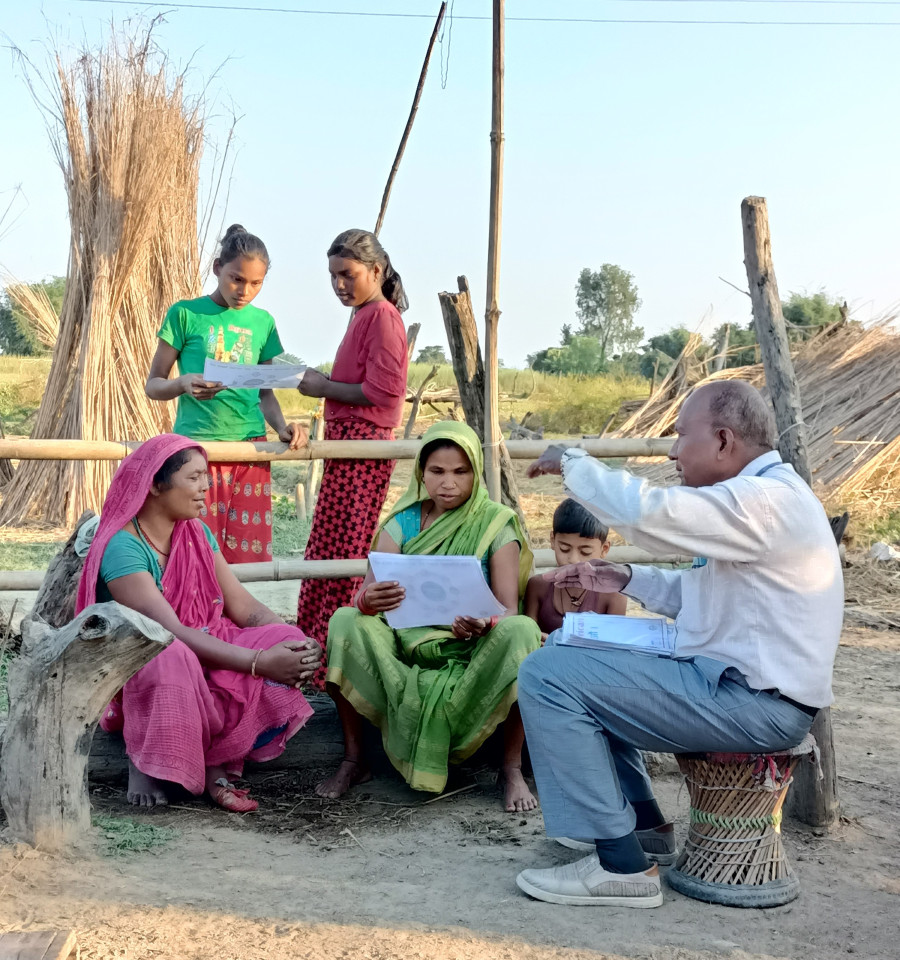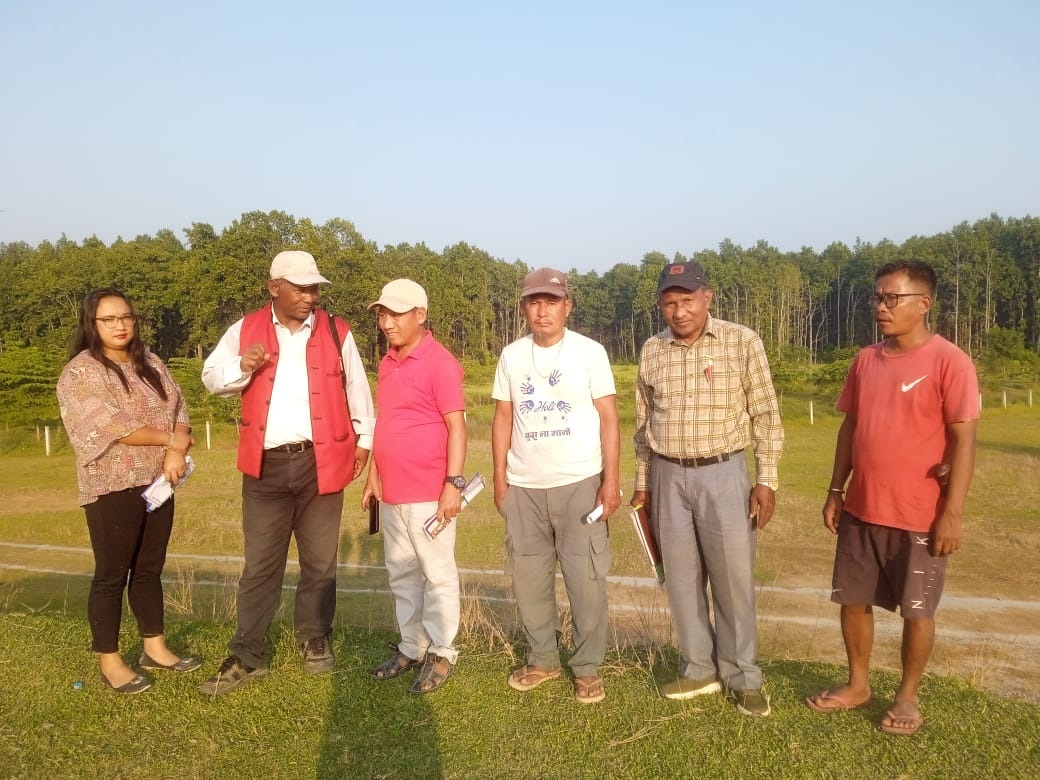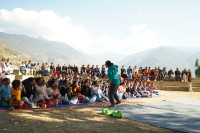Culture & Lifestyle
The accidental champion of biodiversity
Nanda Lal Majhi has dedicated 35 years to biodiversity conservation in Nepal. His efforts underscore the role of local communities in conservation.
Aarati Ray
Nanda Lal Majhi is one of the biggest names in the field of biodiversity conservation in Nepal. Currently the executive director at the Biodiversity Conservation Center Nepal (BCCN), he has spent 35 years working in the field. His journey starts from humble beginnings in Sunsari, Province 1, where the pursuit of education in forestry, chosen out of necessity, became the catalyst for a lifelong commitment to conservation.
When he was 19, Nanda Lal Majhi chose to study forestry in his Intermediate in Science (ISc) as a last straw of hope. He would have never known that it would hold on to him forever and open the doors to the world of conservation—from working as a community forest assistant and agro forester to the executive director.
Majhi was born to a middle-class family of farmers. After completing his SLC (now, SEE), it was clear his parents couldn’t afford to support his further education because of the difficult economic situation. So, Majhi, who was dedicated to studying and supporting his family, chose whatever came his way. Luckily, he applied for the forestry programme and got a scholarship to continue his education in Hetauda.
He recalls, “To be honest, it was not out of passion that I studied forestry. At that time, there was little awareness of conservation and environmental protection. But, I am happy that conservation made its way into my life.” He adds, “I think it was my destiny. Many things have happened in life, but conservation has not let go of me, and I have been unable to let go of it either.”
His father had a great love for trees and birds. Majhi remembers his father used to sit watching the birds that came to eat fruits from the Papaya tree in their backyard. “Whenever someone came to kill the birds, he used to sit in protection and tell them not to harm them. I think that’s where the trait of love for nature came in me,” he says. Continuing his father’s lesson, he has planted many Papaya trees, mainly reserved for the birds around his home.
After completing his ISc, Nanda Lal Majhi spent three years working at Baitadi’s agroforest nursery. In this role, his responsibilities included preserving plants, afforestation, and safeguarding animals and birds. This experience deepened his connection with nature, prompting him to pursue a BSc in forestry with a stronger commitment to protecting innocent lives.
In 1986, he secured a position as a community forest assistant (ranger) at the Department of Forest and Soil Conservation, where he dedicated six years of service. During this time, he made significant contributions to the Chisapani Community Forest in Ramechhap district, renowned as one of Nepal’s exemplary community forests. Majhi’s involvement with community forests has been exceptional; he played a role in developing numerous community forests across Nepal. Regardless of the organisation’s focus, be it conservation or otherwise, he consistently initiated and supported community forest projects.
“The community forest programme and I are like twins. We always find a way to each other,” says Majhi. During his four-year tenure as a natural resource manager at Women Acting Together for Change (WATCH), he worked towards establishing the Women Community Forest in Dakshinkali, Kathmandu.
Most importantly, his efforts in commencing and developing community forests in Namche and Sagarmatha periphery cannot be forgotten. As an agro forester and project manager at the World Wildlife Fund (WWF) Nepal, he spent three years in Namche Bazaar, from 1997 to 2000. He worked in the management and establishment of three community forestry nurseries there. One nursery had a hundred thousand plants, and Majhi had to protect and preserve them with community mobilisation in Namche. The small saplings he planted and looked after 24 years ago have grown into big trees. He helped turn the barren hills of Namche green, which tourists worldwide admire when they visit Sagarmatha. Recognising his work, the Dudhkunda Buffer Zone Community Forest Users Group of Khumbu, Solukhumbu, honoured him with a token of appreciation on World Environment Day (June 5) in 2022.
He remarks, “When I visited Namche, for the event by Dudhkunda, I was amazed to see those tall trees standing strong. It felt as if I was looking at my grown-up children.” Locals, officials and conservationists there thanked him for his efforts.
From his time at WATCH and WWF to being a government ranger, he contributed to community forests in Rupandehi, Okhaldhunga, Dolpa and Pokhara. He is thrilled to see these forests thriving with plants and animals. He further emphasises that community forests in Nepal hold profound emotional significance as they represent a harmonious coexistence with nature and a collective spirit of resilience and unity. He was also honoured by WWF for his work ten months ago.
When Majhi came to Saptari in 2017 as a biodiversity conservation expert of the Integrated Development Society (IDS), he realised how much work needed to be done for human-wildlife conflict management in the Koshi Tappu Wildlife Reserve area and Saptakoshi Landscape to keep local people at the centre. So, after completing the IDS project, Majhi and his friends established the Biodiversity Conservation Center Nepal (BCCN) in Saptari in 2018. For the last five years, he has been an executive director for BCCN, an NGO dedicated to biodiversity conservation in Sunsari, Saptari and Udayapur districts. He and his team have been working with various communities in partnership with rural municipalities, Koshi Tappu Wildlife Reserve, National Trust For Nature Conservation (NTNC) and community groups to address the issues of species conservation, awareness of human-wildlife conflict, promotion of eco-tourism, livelihood and climate change adaptation. Their primary focus is community mobilisation of local people of the buffer zone for conservation, and they have been facilitating and promoting biodiversity-based livelihood adaptive technologies and nature-friendly initiatives.
Majhi highlights the oversight of locals in conservation discussions, emphasising the crucial role of local communities as the primary pillars of biodiversity conservation. He states, “In our attempts to safeguard the Bengal Florican, a critically endangered bird, we’ve recognised the vital importance of engaging locals. Unfortunately, some locals unintentionally harm these birds for meat.”
Majhi acknowledges that hunters are also local residents and asserts that through raising awareness, hunters can transition into conservationists. He underscores the significance of informing and involving locals, including hunters, as essential for successful conservation efforts.

Majhi is also the homestay trainer for IDS, conducting training programmes in various areas in eastern Nepal. He actively promotes homestays through BCCN, not only for eco-tourism but also to boost the income of locals. Majhi emphasises the significance of empowering locals for conservation by creating income opportunities. He states, “If someone lacks the means to eat twice a day, they won’t have the capacity to care for the conservation and life of other species; that’s a fundamental instinct for all social beings. Therefore, empowering locals and generating income for conservation is crucial.”
He disapproves of the recent trend of high-budget conservation programmes in large hotels. He advocates for the success of environmental and biodiversity programmes through implementation in affected communities involving local people. He encourages conservationists to conduct such programmes in homestays, promoting both eco-tourism and conservation education.
Majhi’s 35 years in conservation have been challenging, especially during the early days when awareness and respect for the field were limited. He encountered questions like, “Why are you always roaming in the forest?” The challenges were diverse, from enduring extreme cold in Namche for 22 days and surviving on only potatoes. Adapting to such conditions was initially tough for someone from Tarai like him, but he coped. Yet, living far from his family for over half of his career posed the most significant challenge.
Additionally, conducting door-to-door awareness campaigns was a tough nut to crack when he started BCCN. Majhi states, “People held different beliefs and perspectives. Initially resistant, they didn’t want to listen. However, we persevered, attempting to make them understand from their viewpoint. If someone was religious, we spoke about how nature is akin to a god, providing us with everything we need, emphasising the significance of animals and birds in religious scriptures.” According to Majhi, no one is inherently bad; resolving an issue requires patience and understanding from both sides. Thus, he remains resilient, always moving forward, believing that the earth could be an excellent place for humans and all species if everyone collaborated.
“I know I am old,” he admits, “but my energy and determination for conservation will never grow old. As long as life exists, I will continue working.” Majhi actively engages with youth in the conservation field, advocating for the importance of the new generation. He urges them not only to pursue careers as engineers and doctors, building cement homes and saving humans, but also to consider conservation. Saving the forests and trees, the natural homes of animals and birds should be a shared responsibility.




 8.54°C Kathmandu
8.54°C Kathmandu















